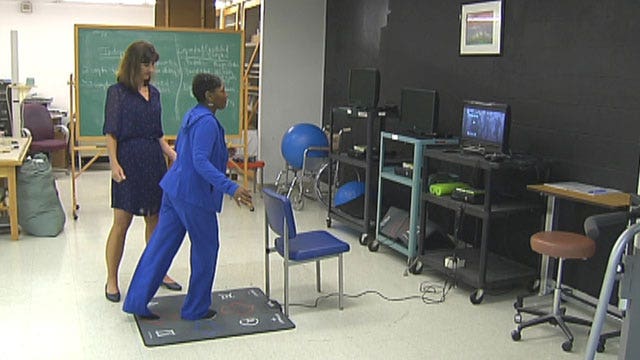‘Dancing’ away MS
Playing video games never used to be a workout. But with new technology making the player a part of the action, they’re helping to ease the symptoms of some multiple sclerosis patients
Playing video games never used to be a workout. But with new technology making the player a part of the action, they’re helping some multiple sclerosis patients get fit and decrease the symptoms of their disease.
“Individuals with MS have a lot of balance issues and vertigo problems,” said Ruchika Prakash, an assistant professor of psychology at The Ohio State University College of Medicine. “There's numbness in the extremities…And then there's spasticity, or the stiffness of the muscles, as a result of which the movement of the joints becomes challenging, becomes restricted.”
In an unconventional study at The Ohio State University Wexner Medical Center, Prakash and her colleagues have been looking at how the game “Dance Dance Revolution” can keep MS patients on their feet.
“We thought this game might motivate them, because it's fun, and entertaining and because the game gives a lot of feedback,” said Anne Kloos, assistant professor of clinical health and rehabilitation sciences at The Ohio State University College of Medicine.
Tracy Blackwell, 51, was diagnosed with MS in 2001 at age 39. The mother of three was forced to retire from her job as a supervisor at the United States Postal System because of extreme fatigue and failing physical ability.
“I couldn't do anything,” said Blackwell. “My left leg dragged, my left arm was almost useless, so it stopped me from living day to day.
Blackwell took various medications, including daily injections, but didn’t see much improvement. With her disease slowly chipping away at her quality of life, her doctor suggested she enroll in the “Dance Dance Revolution” study at OSU.
“Now, I'm on the infusion therapy where I just go once a month,” said Blackwell. “Before I participated in the study, I'd say I walked maybe to the mailbox – and that's not very far – and now I walk a half a mile every day, and I do (“Dance Dance Revolution”) every day.”
Physical limitations aren’t the only issues patients like Blackwell deal with. Many have extreme fatigue and memory problems, so the study also aims to find out if exercise helps with cognitive function in MS patients.
“We believe this may work because of animal studies that have shown that exercise helps create new neurons in the area of the brain where memories are formed,” said Debbie Kegelmeyer, assistant professor of clinical health and rehabilitation sciences at The Ohio State University College of Medicine.
To qualify for the study, participants must have relapsing-remitting MS, the most common form of the disease that is characterized by periods of worsening neurologic function. Participants play the game for an hour, three times a week over the course of eight weeks.
For more information on how to enroll in the study, click here.









































